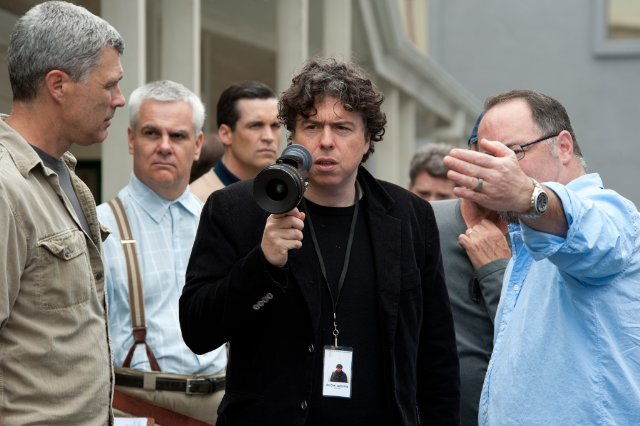Sacha Gervasi’s 35-Day Hitchcock

ABOVE: SACHA GERVASI ON THE SET OF HITCHCOCK. IMAGE COURTESY OF SUZANNE TENNER/FOX SEARCHLIGHT
It’s bizarre to think that Hitchcock, at least in Sacha Gervasi’s hands, wouldn’t have happened without the ’80s cult metal band Anvil. Gervasi, the 46-year-old British journalist/screenwriter/director, is making his narrative feature film debut with Hitchcock, but it was his 2008 documentary Anvil: The Story of Anvil that first attracted the attention of Hitchcock producers Tom Pollack and Ivan Reitman, who decided to gamble on the filmmaker. While Gervasi’s screenwriting credits include the oft-overlooked Spielberg-helmed The Terminal, it was the ragtag story of two Canadian metal misfits, eternally united by burning passion and creative vision, that sealed Gervasi’s fate and allowed him to tell the much higher-profile story of two British misfits bound by similar obsessions. Loosely based on Stephen Rebello’s book, Hitchcock paints a warts-and-all portrait of the famous director, the uphill battle to make Psycho, and Hitch’s tumultuous marriage and creative partnership with Alma Reville. It also reveals that Gervasi was the right man for the job.
Featuring a spot-on Anthony Hopkins in the title role and Helen Mirren as the long suffering yet feisty Alma, Hitchcock bravely casts the spotlight on Alma, a woman who might have otherwise been eternally lost in Hitchcock’s shadow. Neither stuffy biopic nor history lesson, Hitchcock mischievously writes its own history, with Gervasi goading the audience and clearly having fun. We think the Master himself would be pleased.
DREW FORTUNE: The star power that you were able to attract for Hitchcock is staggering. How did the project find you?
SACHA GERVASI: It didn’t fall in my lap. I had to fight for it. It started with Anvil. Tom Pollack and Ivan Reitman and the producers loved that film. They threw me into the mix because they loved Anvil. I went in and pitched them and told them that I loved the love story, and I related to the story of a man who’s willing to throw in all his own money just to make his own movie and connect with his audience, which I had done with Anvil. I was also fascinated with the story of a creative collaboration in a marriage, which is essentially what Anvil was, too. I had a connection into it, and it was lucky that they even entertained the notion of me directing it. In the end, I think I was so passionate that they just went with it.
FORTUNE: Hitchcock’s alienation, failings and self-doubt are really the stars of the show. I can see a similar connection in The Terminal and Anvil.
GERVASI: I really relate to outsider characters. Especially the eccentric, lunatic weirdos like Hitchcock, Viktor Navorski in The Terminal, or the Anvil guys. Everything I’ve done is about these quite eccentric, exotic outsiders who you might see in a certain light at first, but once you scratch the surface a little, you realize that they’re not that different from you. I think there’s an element of that which unites. They’re also about people who in one sense feel trapped, who need to transcend something. Whether it’s a guy living in an airport, or Anvil in Toronto, or Hitchcock who’s imprisoned by his success; there is a common thread to all these characters. I don’t know why I’m particularly drawn to it. It’s been pointed out to me, and I don’t understand it myself.
FORTUNE: Did the down and dirty filmmaking of Anvil prepare you nicely for Hitchcock? This time you had the crew and craft services at your beck and call, but was it still overwhelming?
GERVASI: The good thing about the Anvil school of filmmaking was that it was fly by the seat of your pants. There was no safety net. Even though it’s very different and we had a wonderful studio behind us, we shot Hitchcock in 35 days. We had no money. It was one of those wonderful things where we had the same camaraderie because there was such intense resistance to make the movie. No one wanted to make the movie.
FORTUNE: Why is that? Because it showed Hitch’s failings, or because it was an archaic subject?
GERVASI: No, I think it’s just difficult to get any movie made. It wasn’t so much about the characterization, and I think it was the exact opposite. I think people were interested in the movie because it showed a really different side to Hitchcock. Many different sides, which were not all complimentary, but many diverse traits of character which make this unique, complex man. I think for us, it was an opportunity to do a story that we didn’t know about the marriage. But I think it’s impossible to get any movie made, let alone a character story. Even with big stars, which we had, there were challenges. But we got through it, and we’re really happy that we made the movie. It’s easier to make giant robot movies, but I’m not in that game.
FORTUNE: As a Brit, I assume Hitchcock has always been a big part of your life, but what about Psycho? Was that more of an American phenomenon?
GERVASI: No, I think it’s a worldwide phenomenon. I think everyone who saw that movie, as I did when I was young, was impacted. The shower scene is nuts. It still is, and I think what’s wonderful about it is that it’s universal. People understand the darkness and the violence, and it’s shocking. I doesn’t matter what country you’re from or what age you see it. It has a power to it. Being English definitely gave me some insight into these eccentric Brits puttering around Hollywood.
FORTUNE: I’m a 30-year-old guy, and I didn’t know anything about Alma.
GERVASI: I didn’t either! I went to film school and studied Hitchcock. I knew of her existence, but had no idea really who she was or how influential she was on him. For us, it was a chance to tell this unexpected story.
FORTUNE: I wasn’t sure if Alma was something that got lost in America, that maybe in Britain she was well known.
GERVASI: No, she stayed in the shadows. Go online, and there are hardly any images or film of her. She really stayed out of the limelight on purpose. She didn’t want it, and I think that’s one of the reasons that she’s really lost in the shadows of Hitchcock’s history to a degree. We wanted to bring her out, and show that this woman stood by his side and was not just his wife, but was a critical and trusted collaborator. I think she was the only one Hitch trusted. When it came to issues of taste or what the audience wanted, down to editing, script and casting, he would turn to her first. She was his partner.
FORTUNE: I’m curious about your first meetings with Helen Mirren and Anthony Hopkins. Did you watch old films, or did they easily slide into these roles?
GERVASI: Tony and Helen are so extraordinary. We did a table read and it was done. It was basically “Ok, I’m just gonna film that.” They’re just so good. That’s the great thing. They say 90% of it is casting, and that’s true. I chose the right actors, and luckily I was able to get them to agree to do it. We did a week of rehearsals, and it was just great fun.
FORTUNE: As a filmmaker, what do you see as Hitchcock’s true genius? Was it his camera set-ups, his shadowing, his editing? What inspires you?
GERVASI: I think it was his development of so many dynamic, original ideas, and the idea that he could cross genres and do different types of films. He could create a drama in the tiny space of a lifeboat, or his POV shots, where we went inside the mind of a character, and we could feel every tension, desire and need to love or kill. Sometimes he would play the love scene like a murder scene, and the murder scene like a love scene. He was very twisted. I would say his originality is what stands the test of time, and the different types of films he made. With Psycho, he created a new genre. The talent’s inescapable, the range is inescapable, but above all else, I think it’s the originality of style and story.
FORTUNE: If you could ask Hitch and Alma one question, or say something to them, what would it be?
GERVASI: I speak to them regularly. [pauses, laughs] I don’t know what I’d ask them. Okay, here’s my question: What are we having for dinner? Are we having foie gras?
HITCHCOCK IS OUT IN LIMITED RELEASE THIS FRIDAY, NOVEMBER 23.






